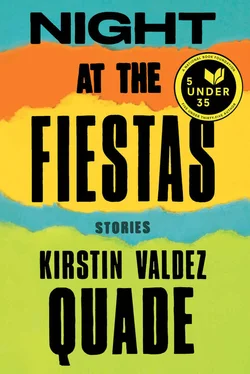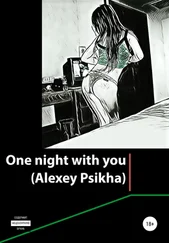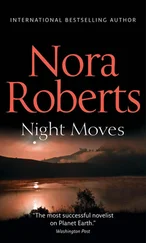“It’s not fair that Elliot gets the car and not us.” Cordelia kicked the dirt.
“You’re right,” said Monica. “It’s not fair.”
“You maybe don’t know this about me, but I’m a kid who loves school.”
Monica catalogued her neighbors, but there was no one she could envision asking for a ride to town. The torpid, obese family in the RV across the way; the desiccated couple with their nylon shorts and extreme low-calorie diet, running endlessly along the highway; the ubiquitous single men as filthy and bearded as miners. When she encountered them, returning a word or a wave in the icy cinder-block bathroom or passing on her walks with Beatrice, Monica couldn’t help imagining sordid stories for them: mental illness, violent crime, shattering personal tragedy. The place caught people like trash in a wire fence, damaged, discarded people blown out of the bright tree-lined towns of America, held here until the wind came up.
Mojave rats, Elliot called them, these denizens of the dust. The Manson Family had camped out here, he informed Monica, had squatted in various ghost towns, lurking in falling wood-framed buildings, carving their names in porch posts and crumbling plaster, before moving on to prepare for Helter Skelter. To Elliot these facts were secondary to the facts about the area’s geology, interesting in their way, but having nothing to do with him.
So Monica held herself aloof, determined that people understand she wasn’t like them. On her walks, she recited poetry to Beatrice. She carried her paperback of Middlemarch with its cover facing out, displaying the nineteenth-century painting. Monica wasn’t proud of her pretentions. But it was so easy to feel disdain for these people, so vital that she not be mistaken for one of them. “My husband is doing research here,” she told the few people she spoke to, and just saying the words comforted her. Research. Husband . These words were her talismans, all that prevented her from sliding into their grim lives. She told herself again and again that her time at Shady Lanes was only prelude to her real life: she would live in a little house filled with books, attend dinner parties with well-traveled intellectuals. She would finish college, the first in her family, maybe even get her master’s. She would be a professor’s wife. Occasionally, Monica even allowed herself to imagine teaching a literature class in a seminar room overlooking a grassy quad. “Come over, have a coffee,” a retired woman from Calgary had invited in the fall, but Monica had declined and afterward had been forced to avoid her. It had been a relief when the woman and her husband fired up their RV and drove east to Arizona.
At the edge of the highway, Monica parked the stroller outside the pay phone, the plexiglass walls of which had been sandblasted into opacity. The phone book covered all of Nye County, but every listing under Heaters, Furnaces, and RVs was located in either Beatty or Tonopah. As Monica leafed through the dusty pages, they flapped and tore. The phone number for the Gypsum hardware store was apparently no longer in service. Just as well, thought Monica dismally; fixing the furnace would cost money they didn’t have.
When Monica looked up, an oncoming semi was growing steadily larger, and Cordelia had drifted away and was inspecting rocks dangerously close to the shoulder of the road.
“Get back!” yelled Monica.
Cordelia looked up, her hands crammed with rocks. “I am back,” she protested.
Just then the eighteen-wheeler passed in a shuddering rush, stirring loose curls of dust along the road. Monica dropped the phone, sending it clanging against the booth, and yanked Cordelia by the arm.
“Don’t you ever —” she started, not caring how much she hurt Cordelia — glad to hurt her, even — but Beatrice, strapped into her stroller as the dust storm blew over her, clutched at her eyes and began to wail.
“Mama!” called Cordelia urgently over the baby’s squalls. “Beatrice has dirt in her eyes.”
“I know ,” snapped Monica, and now Cordelia’s face crumpled, her feelings, as always, wounded.
It was pointless to look at Beatrice’s eyes here; each time Monica managed to pull the little fist away and pry one open, a new gust assaulted them. Beatrice arched her back and screamed in outraged pain. “We’re going home,” said Monica, defeated.
“I’m going to be in deep trouble for missing school,” said Cordelia. She stomped along behind, her thick black hair tangled, lips shading violet.
“You won’t be in trouble. It’s my fault.”
“I know,” said Cordelia.
As Monica collapsed the stroller, she glanced at the RV across the way, where the overweight family lived, and for a brief alarming moment thought she saw a pale face in the dim window, watching her. She blinked and looked again: nothing.
Cordelia hauled herself up the metal steps. “So?” she accused. “What about the heater?”
There was nothing frightening about a face in a window, Monica thought, jiggling Beatrice in her arms. Didn’t Monica look out her own windows? Still, Monica missed Elliot, with his electrical know-how, his logic and warm, male bulk.
“Well?” asked Cordelia.
“Today we’re going to be pioneers.” Monica held open the door for her, and the grit gusted through, chattering on the linoleum.
IMAGINING THEIR LIFE in a trailer from the comfort of their rental in Santa Fe (a ten-minute walk from her mother’s house and where she’d grown up), Monica had thought of Mr. Toad with his gypsy caravan. Before Elliot and Monica had married last year, Elliot’s mother had bought Cordelia a beautiful illustrated copy of The Wind in the Willows . Monica had never read it as a child, and she, with Cordelia, loved the picture of Toad’s caravan, the bright paint (“canary yellow picked out in green”), snug curtained bed, patterned dishes lined up on shelves. The promise of both comfort and adventure.
Their eighteen-foot aluminum Travel Lite, however, delivered neither. Brown stripes outside, dingy brick-patterned linoleum inside, hideous orange plaid curtains that snapped shut. The trailer smelled of particleboard and dust.
Monica turned the oven on high and bundled herself and the girls into the sleeping loft. This might have been a nice way to spend the morning, cozy and giggling in the nest of sleeping bags with their books. When she wanted to be, Cordelia was excellent company, a watchful performer, making droll observations for her mother’s benefit. Instead, they were all sluggish and irritable. Beatrice whimpered with discomfort while Monica and Cordelia took turns wiping her chapped nose.
“ Toad has a heater,” Cordelia observed pointedly. She clawed through the book and indicated the cozy potbellied woodstove on their favorite page.
“Yes,” Monica agreed and sighed, exhausted by the relentless optimism motherhood demanded. “But Toad didn’t have lots of things we have. Radio. Indoor plumbing.”
“Not here. Not here we don’t have indoor plumbing.” Her tone was injured. “Look at Beatrice,” she demanded, pointing to the baby’s unsightly muzzle. “You should take her to a doctor. She isn’t even cute anymore.”
Monica dabbed at the baby’s nose, which certainly did look worse than it was. “It’s dry skin. We live in a very dry place. The doctor will just tell us to put Vaseline on her, Cordelia. Which I’m doing.”
Monica was no fool: she could read the signs of a child in survival mode. Even as a baby, Cordelia had known to fall silent when her parents fought; to this day, if Elliot was curt, she stiffened, wary. Cordelia’s watchfulness made Monica uneasy. Now, with the arrival of Beatrice, her personality had developed into something sterner still. She guarded her sister vigilantly, turned a fierce eye on her mother and stepfather, evaluating their every move. “Too rough ,” she’d scold Elliot when he swung the gleeful baby. “Her arms could fall off.”
Читать дальше












